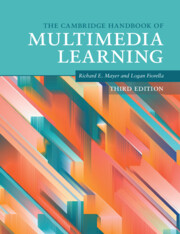Book contents
- The Cambridge Handbook of Multimedia Learning
- The Cambridge Handbook of Multimedia Learning
- Copyright page
- Contents
- Figures
- Tables
- Contributors
- Preface
- Acknowledgments
- Part I Background
- Part II Theoretical Foundations
- Part III Basic Principles of Multimedia Learning
- 11 The Multimedia Principle
- 12 The Multiple Representations Principle in Multimedia Learning
- 13 The Expertise Reversal Principle in Multimedia Learning
- Part IV Principles for Reducing Extraneous Processing in Multimedia Learning
- Part V Principles for Managing Essential Processing in Multimedia Learning
- Part VI Principles Based on Social and Affective Features of Multimedia Learning
- Part VII Principles Based on Generative Activity in Multimedia Learning
- Part VIII Multimedia Learning with Media
- Author Index
- Subject Index
- References
13 - The Expertise Reversal Principle in Multimedia Learning
from Part III - Basic Principles of Multimedia Learning
Published online by Cambridge University Press: 19 November 2021
- The Cambridge Handbook of Multimedia Learning
- The Cambridge Handbook of Multimedia Learning
- Copyright page
- Contents
- Figures
- Tables
- Contributors
- Preface
- Acknowledgments
- Part I Background
- Part II Theoretical Foundations
- Part III Basic Principles of Multimedia Learning
- 11 The Multimedia Principle
- 12 The Multiple Representations Principle in Multimedia Learning
- 13 The Expertise Reversal Principle in Multimedia Learning
- Part IV Principles for Reducing Extraneous Processing in Multimedia Learning
- Part V Principles for Managing Essential Processing in Multimedia Learning
- Part VI Principles Based on Social and Affective Features of Multimedia Learning
- Part VII Principles Based on Generative Activity in Multimedia Learning
- Part VIII Multimedia Learning with Media
- Author Index
- Subject Index
- References
Summary
This chapter summarizes research and theory concerned with the effects of learner expertise (prior knowledge) on multimedia learning. According to the expertise reversal principle, in many situations, design principles that are effective for novice learners may not be effective or even hinder learning for more knowledgeable learners. The main theoretical issue associated with this principle concerns the integration in working memory of instructional information with knowledge structures held in long-term memory. The major instructional implication is the need to tailor instructional formats and procedures to changing levels of expertise. The chapter also suggests future research directions.
- Type
- Chapter
- Information
- The Cambridge Handbook of Multimedia Learning , pp. 171 - 182Publisher: Cambridge University PressPrint publication year: 2021
References
- 7
- Cited by

